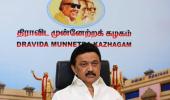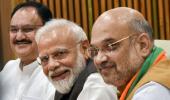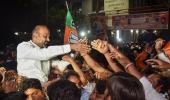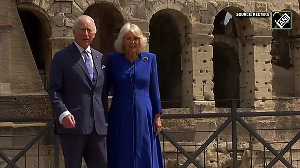The BJP has incorporated caste as a significant component of its politics.
Radhika Ramaseshan reports.

Like in West Bengal where the Bharatiya Janata Party buckled down to tuning up the party's organisation and workforce for the 2021 election after a credible showing in the Lok Sabha polls, the party in Telangana has not wasted a moment to build on the gains registered first in the parliamentary election, and then the Dubbak assembly by-election, followed by the Greater Hyderabad Municipal Corporation polls.
Brick by brick, row upon row and course upon course, a structure is being laid to fortify the BJP before a slew of electoral challenges ahead of the 2023 state polls.
"The construction should be strong enough to resist the combined force of the TRS (Telangana Rashtra Samithi) and the AIMIM (All India Majlis-e-Ittehad-ul Muslimeen)," said a BJP functionary in Telangana.
In building itself up as an alternative, the BJP resolutely focussed on projecting Chief Minister K Chandrasekhar Rao and his clan as its principal adversary.
"The father-son regime is so discredited that in the GHMC election, there was only a 0.3 per cent difference between the votes the TRS and BJP polled. We lost narrowly," points out G Kishan Reddy, the Secunderabad MP and Union minister of state for home. "This despite the CM promising free drinking water for all and a 50 per cent house tax reduction for every section."
Reddy is part of a crack team in Telangana which is helmed by Bandi Sanjay Kumar, the state BJP president, and includes Manthri Srinivasulu, state general secretary (organisation), D K Aruna, national vice-president, and Dharmapuri Arvind, Nizamabad MP.
Telangana BJP Spokesperson K Krishna Saagar Rao says in his second term as the CM, KCR has "given us hot button issues -- the flood and pandemic mismanagement, not delivering on the promised two-bedroom homes (for the poor), stalling land registration for over three months, and no jobs for the young."
Tarun Chugh, the BJP's national general secretary minding Telangana, said the BJP's campaign will hinge on the "raja-rajwada-jagir" versus the poor theme.
"The CM behaves like an overlord. Our programmes are poor-oriented, be it building toilets, free food rations amid the Covid pandemic, or economic relief package," says Chugh.
The BJP's victory in the Dubbak by-election in November gave a fillip to the "pro-poor" thrust.
Dubbak was held by the TRS' Solipet Ramachandra Reddy, who died in harness.
The party fielded his wife Sujatha, believing her victory was foregone.
The BJP's nominee, M Raghunandan Rao, beat her, playing on the neglect of the economically backward constituency.
The BJP especially reached out to the Dalits and Kuruma Golla Yadavs.
The Dubbak success prodded the BJP to enlarge, as well as hone its social engineering strategy, although BJP Spokesperson K Krishna Saagar Rao claimed Telangana was never a caste seedbed.
"The TRS tries to balance bad governance and incompetence with caste, but even in undivided Andhra Pradesh this region (Telangana) never had caste politics," says Saagar Rao.
The BJP itself upended the purportedly unwritten rule and incorporated caste as a significant component of its politics.
Other backward classes and most backward classes form 50.7 per cent of the population, according to the 2010 Srikrishna Committee on Telangana, but were under-represented in undivided Andhra's Reddy and Kamma-dominated politics.
The BJP cottoned on to this aspect.
Bandi Sanjay Kumar and Srinivasulu, key state BJP officials, are from the backward castes.
In the GHMC election, the BJP gave 26 of the 149 tickets to MBCs, of whom eight were elected, along with 17 OBCs.
Nearly half its state leaders are from the backward castes of Gowd, Kuruma Golla Yadav, Munnuru Kapu and Padmashali.
The biggest factor working to the BJP's advantage is the "emptying out" of the Telugu Desam Party, as Kishan Reddy put it.
Weatherworn by the setbacks suffered in Telangana, the TDP withdrew and confined itself to Andhra Pradesh.
Its local leaders, functionaries, and workers moved en masse to the BJP.
A source said a "dysfunctional" Congress forced its "dispirited" activists to migrate to the BJP.
Aruna, a former Congress minister, said: "The Congress is nothing. Its sarpanches and ward presidents are joining the BJP."
Srinivasulu rejected the thesis that the BJP's growth was proportional to the Congress's decline.
"There's excitement among people about us. In the Hyderabad polls, if 50 per cent of electioneering was handled by our cadre, the rest was in the hands of the public," he claimed.
Since the BJP believed in working from ground zero first, it set up booth committees in 22,000 of the 34,000 booths complete with panna pramukhs to reach out to the voters.
Meanwhile, it's preparing hard to win the civic polls in Greater Warangal, Siddipet, and Khammam.












 © 2025
© 2025